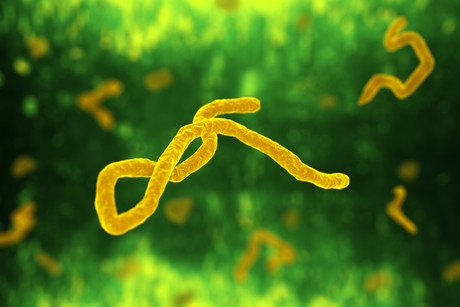How does the immune system protect itself against Ebola?

Two types of human antibodies that target different parts of the Ebola virus synergise their antiviral effects by inhibiting different steps of infection, according to a new study from US researchers — an insight which could lead to the development of effective antibody-based therapies.
The unprecedented Ebola virus epidemic in West Africa from 2013 to 2016 resulted in more than 11,000 human fatalities, demonstrating the urgent need for treatments against this virus and related highly pathogenic filoviruses. Yet despite intense international collaborative efforts, there is still no licensed therapeutic available against filovirus disease.
Further progress in the development of effective antibody-based therapies for filovirus infections requires a better understanding of the mechanism underlying their protective effect. Although the human immune system can produce strong antibody responses against filoviruses, the effects on multiple steps of filovirus infection have not been clear.
To address this gap in knowledge, Philipp Ilinykh from the University of Texas Medical Branch and colleagues evaluated the mechanisms underlying the antiviral effects of a diverse panel of monoclonal antibodies obtained from several survivors of natural Ebola virus infections. The results of their work were published in the journal PLOS Pathogens.
The researchers found that monoclonal antibodies that targeted either the glycan cap or stem region of the viral glycoprotein interfered with and targeted different steps of filovirus infection. For example, glycan cap-specific antibodies inhibited viral attachment to the cell surface, cell-to-cell transmission and virion budding. By contrast, stem-specific antibodies triggered the activation of natural killer cells and the destruction of infected cells by monocytes and neutrophils.
Taken together, the findings suggest that different types of antibodies exert cooperative effects by blocking distinct steps of filovirus infection. According to the authors, antibody cocktails that combine complementary antiviral effects should be tested in future studies.
“The current approach for treatment of filovirus infections with antibody cocktails tested in animal models utilises the principle of targeting of non-overlapping epitopes,” said Alexander Bukreyev, a co-author on the study. “Our study suggests that possible synergistic effects of antibodies which block various steps of viral replication should be also considered.”
argenx and Monash University partner against autoimmune diseases
To advance a pioneering molecule for autoimmune diseases, global immunology company argenx has...
Archer completes potassium sensing alpha prototype
Quantum technology company Archer Materials Limited has developed an early Biochip prototype...
Farm animals and aquaculture cryopreservation partnership announced
Vitrafy Life Sciences Limited has announced that it has entered a 12-month exclusive agreement...



